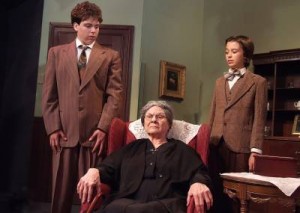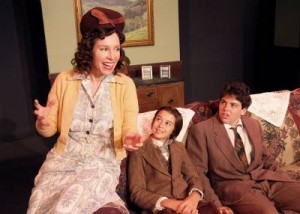
Lost In Yonkers is considered by many to be the best play Neil Simon has ever written. It’s certainly the finest work I’ve seen by this most prolific of American playwrights, and won Simon both the 1991 Tony and the Pulitzer Prize. Not bad for a writer once best known for frothy fare like Come Blow Your Horn and Barefoot In The Park. The original Broadway production of Lost In Yonkers also won Tonys for three of its actors (Mercedes Ruehl, Irene Worth, and Kevin Spacey) and scored a Tony nomination for director Gene Saks.
The absolutely wonderful revival now playing at Theatre 40 in Beverly Hills features performances and direction every bit as deserving of accolades as the Broadway original.
Set in WWII Yonkers, New York, Simon’s dramedy recounts the ten months young Jay and Artie spent with ditzy Aunt Bella and their German-Jewish “grandmother from hell.” Jay (15) and Artie (13) have recently suffered the loss of their mother to cancer, an illness which has put their dad, Eddie, severely in debt to a rapacious loan shark. Dad’s solution (to head south and earn enough money to pay off his debts) means leaving his two teens behind, and with Grandma The Hun.
Grandma Kurnitz suffered a foot injury as a child and walks with a multi-purpose cane, just right for administering punishment to a disobedient child. Reveals Jay, “Pop said she could swing her cane so fast, she could have been one of the greatest golfers in the world.” Oldest son Louie works as “some big mobster’s henchman,” which Artie at first confuses with “hunchback” until Jay corrects him. Daughter Gert has a unique speech defect; she says the first half of every sentence breathing out and the second half sucking the air back in. (“I once saw her try to blow out a candle,” says Jay. “Halfway there she sucked it back on.”) Finally, there’s Bella, whom Jay describes as “a little closed for repairs.” When Artie wonders about Aunt Bella’s education level, Jay informs him that she did go to high school … a little, but “she missed the first year because she couldn’t find it.”
Lost In Yonkers adroitly balances a trio of plots—Jay and Artie’s attempt to survive a year with “Frankenstein’s Grandma,” Bella’s wish to marry a movie usher named Johnny (contingent on getting her mother to give her $5000 so that Johnny can open a restaurant), and the surprise visit of Uncle Louie on the lam from the mob).
Neil Simon is justly renowned for his one-liners, and Lost In Yonkers is not without them. Take for example:
Arty: What movie did you see?
Bella: I don’t know. I couldn’t find the theater I was looking for, so I went to the one I found.
and
Arty: Isn’t Grandma partly deaf?
Bella: Oh sure. But the other part hears perfectly.
What sets Lost In Yonkers apart from the rest of the Neil Simon oeuvre are its two unforgettable female characters, Bella and Grandma Kurnitz, probably the two most complex and multilayered women the master playwright has ever created.
Bella may seem at first to be nothing but a dim bulb. After all, she knocks on the door of her own apartment because she’s forgotten her key, then explains that she got in the downstairs door by using her spare. But Bella is also a woman with hopes and dreams and fears and longings, a sad awareness of her shortcomings, and occasional flashes of intelligence and wisdom. The role won Mercedes Ruehl a Tony, and Theatre 40’s Maria Spassoff could easily find herself in awards competition with her own magnificent take on Bella. Spassoff’s performance is one that starts strong, and just keeps getting richer. By the time of her final dramatic confrontation with her stone-hearted mother, tears filling Bella’s eyes and snot dripping from her nose, Spassoff has created one of the year’s most memorable characters.

The role of Grandma is a tough one. This is a woman who has vowed never to cry, a mother who never allowed her children to cry, and over the course of the play exhibits nary a hint of tenderness. In the hands of a lesser actress than Nan Tepper, the role could descend into caricature or stereotype, but Tepper somehow manages to let us know that there is something human behind those eyes of steel. (Simon’s great writing helps of course.) There is one particular moment in the second act where Tepper leaves the audience gasping, and the aforementioned confrontation between Bella and Grandma owes as much to Tepper’s gifts as an actress as to Spassoff’s.
The two grandsons have been cast to perfection.
As Jay, Zav Hershfield has the Simon rhythms down pat, nailing every laugh line all the while creating a very real teenager. It is, however, in one particularly powerful moment in Act 1, when Jay cries out his hatred of his mom for dying, his dad for putting his kids in this spot, his grandma for being such a rotten old lady, and indeed his hatred of the world for being so cruel—that we realize what an amazing young actor Hershfield is. Absolutely real and at this particular moment, heartbreaking.
14-year-old Bridger Zadina is almost too cute for words, but he’s also a master of comic timing, and his facial expressions are a delight to behold. Just wait for Zadina’s imitation of his uncle Louie’s physical definition of “moxie” and you’ll see what an emerging talent this lad is.
Uncle Louie is a great role for any actor. Kevin Spacey won a Tony for it, and though Lary Ohlson is a tad old for the role, his performance is so rich that this is soon forgiven. Amy Tolsky creates yet another vivid character in breathing-challenged Aunt Gert, never allowing Gert’s idiosyncrasies to become caricature. An excellent Scott Facher completes the cast as Eddie, the boys’ father, revealing a man almost broken by tragedy but hanging on for the sake of his sons.
Last season’s unforgettable Modern Orthodox demonstrated director Howard Teichman’s skill at balancing comedy and drama, a talent which Lost In Yonkers confirms. It helps that Teichman has cast the production with prodigiously talented actors, but his is the hand which has kept them all on the same page, and kudos are in order.
As always, design elements are class A, beginning with Jeff G. Rack’s nicely detailed set design, Ellen Monocroussos’s mood enhancing lighting, Christine Cover-Ferro’s terrific 1942 costumes, and William Froggatt’s fine sound design.
Amidst the abundance of World Premieres, West Coast Premieres, and Los Angeles Premieres our stage scene offers, it’s always a pleasure (and an audience draw) when a contemporary classic like Lost In Yonkers is revived. Even on a Tuesday, Theatre 40 was nearly filled to capacity, and curtain call audience cheers were loud indeed…and amply deserved. What a joy it is to once again get Lost In Yonkers!
Theatre 40, 241 S. Moreno Dr., Beverly Hills.
www.theatre40.org
–Steven Stanley
August 5, 2008
Photos: Ed Krieger



 Since 2007, Steven Stanley's StageSceneLA.com has spotlighted the best in Southern California theater via reviews, interviews, and its annual StageSceneLA Scenies.
Since 2007, Steven Stanley's StageSceneLA.com has spotlighted the best in Southern California theater via reviews, interviews, and its annual StageSceneLA Scenies.







 COPYRIGHT 2024 STEVEN STANLEY :: DESIGN BY
COPYRIGHT 2024 STEVEN STANLEY :: DESIGN BY